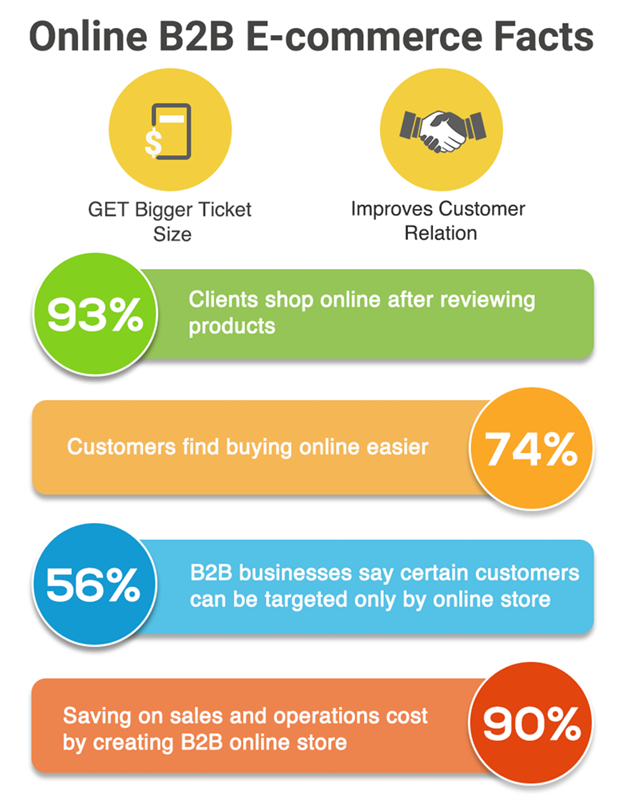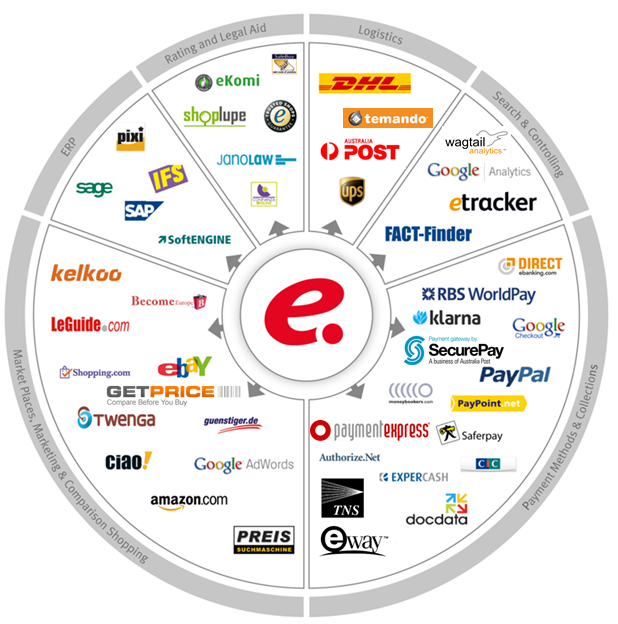
According to Frost & Sullivan, B2B eCommerce sales are expected to be over $12 trillion this year. Are you getting your share? If you haven’t established an online presence or haven’t compared your platform with modern B2B eCommerce solutions, the answer to this question is a resounding “no.” To be successful in B2B these days, you need a strong web presence powered by one of the top B2B eCommerce platforms. Here’s a look at the most popular B2B eCommerce software solutions and what to look for when choosing the best B2B eCommerce solution to fuel success.
Get Free Demo: Best Ecommerce Platform Software in 2020
Digitize or Die: Your Business Must Transform for Success
Everyone loves Amazon. It’s the singular platform that transformed how people expect to shop online. These days, B2B buyers and purchasing agents expect the same experience making purchases at work as they do when they personally shop at home from the comfort of their couch. Buyers want a self-serve model that offers 24/7 support and facilitates ordering from the desktop or their mobile phone. If you aren’t giving your customers this online experience, they won’t be your customers much longer. Just look at these benefits of selling online.

But once you know the benefits of selling online, you’ve got to know how to do it right. B2B sellers must do more than offer product descriptions and pictures on-line; they need to provide customers the ability to request quotes, view personalized catalogs with negotiated pricing, and use a variety of checkout workflows, including terms. In short, B2B buyers want to maintain the same type of relationships they enjoyed in the past – they just want them digitized and served up with online convenience.
Giving B2B customers what they want requires a B2B eCommerce platform that provides the features that your customers and your business need to succeed.
5 Key Features of B2B eCommerce Platform
Just as in picking any digital solution, start with a baseline of your business needs. From there, add on the features you need to be successful marketing and selling on-line. While every business has unique needs, here are the key features that every B2B eCommerce software you consider should provide.
1. Designed with B2B Digital Commerce in Mind
If you are a manufacturer, distributor, or wholesaler, you already know that your business is very different from B2C eCommerce. The best B2B eCommerce platform providers understand this. Their solutions are built from the ground up for how B2B sellers do business. That means they incorporate EDI and punchout catalog integration and easily accommodate selling the same SKU in multiple units. B2C sales are generally one-off transactions, but B2B sales are built on relationships that last for years. A 360° view of every customer and transaction is critical to maintaining these relationships. Your eCommerce platform should either come with a CRM component or easily integrate with any of the major CRM solutions.
2. Personalized Catalogs and Pricing
In B2B, prices are negotiated on a per-contract basis. When your customers sign-in, they should see personalized products and their negotiated prices. Any preset shipping preferences should be incorporated as part of the checkout workflow. And speaking of checkouts, your B2B eCommerce platform should provide you the ability to check credit and extend terms in the blink of an eye.
3. Quick Recorder and Easy Checkout Features
Since B2B buyers purchase the same items at regular intervals, look for functionality that lets you offer quick recorder forms and order history review to make reordering easy. B2B buyers are busy, and you want to remove as much friction as possible from the reorder process. The reorder workflow should include a streamlined checkout feature to minimize the amount of time and the number of screens it takes to complete the transaction. One-page checkout is a must.
4. User-Defined Authorities and Roles
In a B2C sale, the customer looks at your product, makes the decision to buy, and whips out their credit card to complete the transaction. If only B2B selling were that simple. Many B2B transactions involve multiple decision-makers and buyers with different levels of purchasing authority. If this describes your customers, be sure to look for an eCommerce solution that allows the user to define the roles, responsibilities, and purchasing authorities that reflect how their organization does business.
5. Maximum Flexibility
No eCommerce platform will come completely out-of-the-box personalized for how you do business. You’ll want to look for solutions that are easy to customize and provide flexible workflows that adapt the software to the way your company does business. Generally, open-source solutions come with a rich ecosystem of extensions and plugins that you don’t find in proprietary solutions. In addition, look for the flexibility to deploy on-premise or in the cloud. You’ll also want the flexibility to scale as you grow.
Best of the Best B2B eCommerce Platforms List
Once you start your search for the ideal B2B eCommerce platform, you’ll find the same names popping up repeatedly. That’s because a few major players really understand B2B eCommerce needs. Here are the top B2B eCommerce solutions you should consider for success in online sales.
1. OroCommerce
Oro disrupted the eCommerce solution space when they released OroCommerce, the first eCommerce platform designed specifically with B2B in mind. This open-source solution is one of the very few that gives you the option to deploy on-premise or in the cloud. It is highly customizable yet comes out-of-the-box with all the key functions that every B2B eCommerce seller needs. This open-source solution enjoys a rich ecosystem of extensions and plug-ins and a large and active community. Because it includes advanced SEO and marketing support as well as built-in CRM, it’s really more than just a platform and more a sales engine that drives revenue.
2. HCL Commerce
Until recently, this product was known as IBM Websphere Commerce. It comes out of the box with many features you need to get up and run quickly. Unlike the other options (except for OroCommerce), it has a powerful workflow engine that allows for easy customization. There is not an on-premise option, but cloud deployment allows this solution to scale easily.
3. SAP Commerce Cloud
Formerly known as Hybris, this solution is geared for high-volume Enterprise-grade instances that can afford extensive development costs. It’s powerful content management, and marketing functions are highly effective but not intuitive. Because it is a cloud-based solution, you are assured your data is secure. If you use the SAP ERP, integration is fairly simple to create an end-to-end solution. It can handle both B2B and B2C eCommerce, but some of the older modules are difficult to customize.
4. NetSuite Suite Commerce
If you run the NetSuite ERP, then this might be the obvious solution for you. It supports multi-channel sales, which is great if you have a brick and mortar presence or still need to process phone orders. As you can imagine, it integrates easily with other NetSuite products. It supports B2B and B2C commerce. Unfortunately, this cloud-based option has a complex user interface, so you’ll need to rely heavily on in-house or outsourced development to get up and run quickly.
5. Salesforce Cloud Commerce
This B2B eCommerce offering integrates with other Salesforce products, which is important as any successful seller either needs a built-in CRM or an easy CRM integration. Features include easy to set up catalogs and coupons. Extensions for integration for social media marketing are available too. Allows for customized reports to capture the data you need to support sales and marketing.
6. Magento
Originally built as a B2C eCommerce platform, Magento 2 has a number of features that now make it suitable for B2B selling. It is an open-source solution with an active community. Like OroCommerce, it allows customers to upload CSV files for quick reordering and supports multiple companies with one installation. It allows easy custom catalog creation and supports multiple price lists.
How to Choose the Best B2B eCommerce Solution for Your Business?
When it comes to choosing the best B2B eCommerce solution for your business, success looks beyond the platform. Evaluate the availability of solution partners to help you integrate your new platform with your existing architecture. Remember, your eCommerce solution isn’t an island and will need to integrate with payment gateways, ERP, PIM, CRM, 3PL, and other solutions.

Look to the future, and don’t let your platform hinder your ambitions. The right platform will scale as you grow and give you the SEO and marketing tools you need to fuel that growth. Not sure where to get started? Download this free RFP template and customize it to your needs. It goes beyond eCommerce features to help you identify potential technical issues and covers licensing and pricing too.
Conclusion
No two businesses are alike, and no two B2B eCommerce installations will look the same. For the fastest ROI, look for the solution,
- with the majority of the features, you need out of the box
- can easily be customized
- integrates seamlessly with the existing architecture.
Those are the keys to selecting the best B2B eCommerce solution for your company’s success.
Need Any Technology Assistance? Call Pursho @ 0731-6725516




